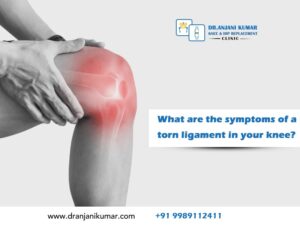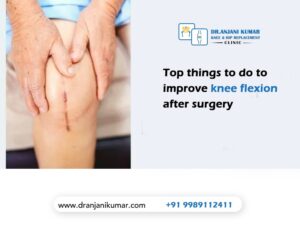Those who have an injury to the ACL, one of the major ligaments in the knee joint, may require ACL (anterior cruciate ligament) surgery. The ACL aids in limiting excessive tibia (lower leg bone) forward movement about the femur by stabilising the knee joint (thigh bone).
Sudden twisting or pivoting motions when participating in sports such as basketball, soccer, skiing, or football frequently result in an ACL injury. The damage could also happen due to a fall, a car accident, or any other stressful incident that harms the knee joint.
ACL injuries frequently show the following indications and symptoms:
- A loud popping noise is audible during the injury.
- Knee joint discomfort and oedema
- Knee joint with a restricted range of motion
- Instability or a sense that the knee joint is giving way
- Weight-bearing on the afflicted limb is difficult.
ACL surgery might be essential if ACL damage is serious or results in knee joint instability. Those who are youthful, energetic, and partake in physically demanding occupations like manual labourers or athletes are frequently advised to have the operation.
ACL surgery can assist the knee joint in regaining stability, ease pain, and stop additional harm or injury to the knee joint. Nonetheless, one should choose to undergo an ACL operation with a trained orthopaedic surgeon who can assess the patient’s unique condition and suggest the best course of action.
The ACL stabilises the knee joint, and sports like basketball, football, and soccer that require quick stops, turns, or pivots frequently result in ACL injuries.
When non-surgical treatments, including rest, physical therapy, and bracing, are ineffective or when the damage is serious enough to necessitate surgery, ACL surgery may be advised.
The patient may require ACL surgery if the anterior cruciate ligament (ACL) has been completely torn or the knee joint is unstable due to a partial tear or another injury.

ACL surgery is frequently required for the following reasons:
Sports injury: ACL injuries are frequent in sports like soccer, basketball, and football, which require jumping, twisting, or rotating.
Accidents or trauma: A sudden hit or blow to the knee, such as a vehicle accident or a tumble, can result in an ACL tear.
Chronic instability: Some individuals may experience chronic instability in their knees due to recurrent traumas or gradual ligament deterioration.
Pre-existing conditions: Those who have weak knee ligaments or hypermobility syndrome, for example, are more likely to suffer from an ACL injury.
A person should contact a doctor or orthopaedic expert for an evaluation if they have knee discomfort, oedema, or instability, which are signs of an ACL injury. The doctor may advise conservative treatment options, including physical therapy, bracing, or surgery to repair or reconstruct the ACL, depending on the degree of the damage, the patient’s goals, and their activity level.
How long after ACL surgery can you walk?
Anterior cruciate ligament (ACL) surgery recovery time might vary based on the particular case, the severity of the injury, the surgical technique, and the rehabilitation regimen. But, it can generally take several months or more to recover from ACL surgery.
Patients can typically resume daily activities within 4-6 weeks post-surgery, including walking and light exercise. However, full recovery and returning to sports or other high-impact activities may take several months or longer, depending on the individual instance.

To guarantee a secure and effective recovery, it’s crucial to carefully follow the surgeon’s post-operative instructions and show up at all suggested follow-up appointments.
The precise time frame for when a patient can start walking independently without crutches or other support will vary depending on the circumstances of each case and the particular surgical approach used. Patients can generally start partial weight-bearing on the injured leg within a few days to a week of surgery with crutches or a brace. The patient’s development will be tracked by the surgeon and physical therapist, who will, if necessary, modify the rehabilitation plan. The patient will eventually start performing exercises to regain strength, flexibility, and balance. They will also gradually increase the weight that can be supported on the injured leg.
To guarantee a secure and effective recovery, it’s crucial to carefully follow the surgeon’s post-operative instructions and show up at all suggested follow-up appointments.
Dr Anjani Kumar has 20 years of experience and successfully performed 2000 knee replacement surgeries, 350 hip replacement surgeries, and 500 pelvic acetabular surgeries throughout his career.
E-mail: anjanikumar@ gmail.com
Dr Anjani Kumar is an orthopaedic specialist in Kukatpally Hyderabad for ligament injuries, pelvic acetabular fractures treatment, and knee and hip surgeries in Telangana and AP. He is the best Knee Surgeon in Kukatpally Hyderabad, Kadapa and Anantapur. Restore your hip joints and knee function with replacement or revision surgery in Kukatpally, Kadapa and Anantapur.
Contact now 9989112411 Dr Anjani Kumar, the best knee surgeon and hip specialist in Kukatpally, Kadapa and Anantapur. Restore your knee joint function with knee surgery. Get knee fractures treatment and knee replacement surgeries like Total knee replacement (TKR), Partial knee replacement (PKR), Revision knee replacement etc.
Dr Anjani Kumar is the best hip surgeon in Kukatpally, Kadapa and Anantapur. Restore your hip function with revision hip joint replacement surgery. Get hip fractures treatment and hip replacement surgeries like Total hip replacement (THR), Partial hip replacement (PHR), Revision hip replacement etc.
Dr Anjani Kumar is serving all patients in & near the Kukatpally Hyderabad, Kadapa and Anantapur cities in Andhra Pradesh.




